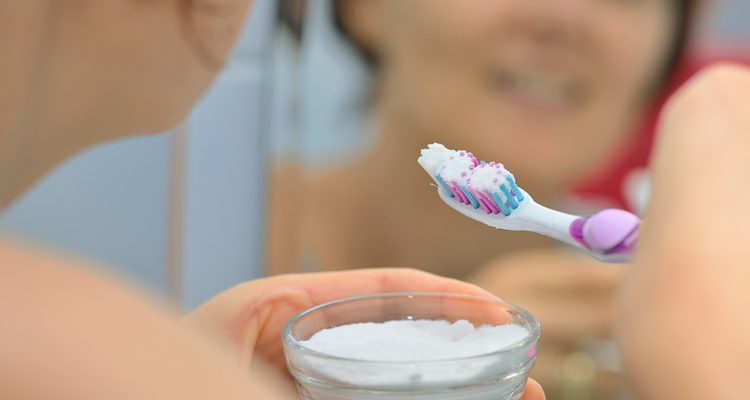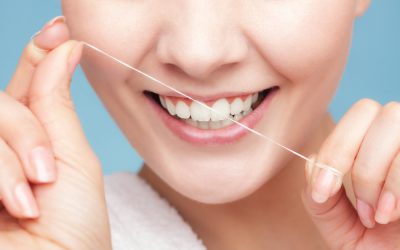You may already know that baking soda is used for everything from baking cakes to de-staining carpets – but can it safely be used to clean your teeth too? Baking soda (sodium bicarbonate) is a chemical compound that has several household applications. It can be found in cakes and breads, because its leavening properties cause the dough to rise. It can also be used to remove tough stains and polish silverware. These days, sodium bicarbonate is also an ingredient found in many toothpastes.
One helpful dental use for sodium bicarbonate is to eliminate bad breath. Halitosis is caused by the release of acid from food remains caught in your teeth. Baking soda helps balance the acidity levels in your mouth, which reduces nasty odor. Another helpful use for sodium bicarbonate is to treat painful mouth sores. The acids in your mouth can further irritate ulcers, but sodium bicarbonate neutralizes acidity and eases the pain.
Baking soda is most often advocated for dental use because of its natural whitening properties and its ability to remove plaque. And some people substitute a mixture of sodium bicarbonate and water for toothpaste to brush their teeth. But can baking soda replace toothpaste for day-to-day brushing? Here’s a breakdown of the pros and cons of using this compound as a substitute toothpaste on your teeth:
Baking Soda for Teeth Whitening
Pro: Baking soda is a mild abrasive that can remove surface stains and yellowing. It has a lower hardness than other abrasive materials used to whiten teeth.
Con: It can still wear away your enamel and damage your teeth and gums with improper use. Even though it is not as abrasive as other whitening agents, vigorous daily brushing with a sodium bicarbonate solution will start to erode tooth enamel, which helps protect and strengthen your teeth.
Baking Soda for Plaque Removal
Pro: Baking soda is effective at breaking up plaque formation and reducing plaque acidity. After you eat and drink, sugars that remain trapped in your teeth react with bacteria in your mouth to produce acid. Once the acid drops below a critical pH level (the measure of acidity of a solution), it eats away at enamel and dentin to cause tooth decay. Sodium bicarbonate raises the pH level in your mouth and creates an alkaline environment that stops the formation of cavities.
Con: If you brush your teeth with baking soda, it’s not enough on its own to kill bacteria, remove plaque, and prevent cavities. While sodium bicarbonate can help break up plaque, over time it won’t be able to control plaque build-up and eventual tooth decay. Additionally, sodium bicarbonate doesn’t contain any fluoride, which helps strengthen tooth enamel and protect your teeth and gums from decay.
The Best Way to Use Baking Soda for Dental Health
If you have a permanent retainer or braces with orthodontic glue, do not use sodium bicarbonate to brush your teeth because it will weaken the glue over time. It can also wear down the glaze on porcelain crowns.
Using a toothpaste with sodium bicarbonate is the best way to reap the dental benefits of baking soda. The amount in toothpaste is small enough to protect your enamel from erosion, and toothpaste also contains fluoride to strengthen your teeth and protect them from decay. And some studies suggest that toothpastes containing baking soda remove more yellow surface stains than toothpastes without it. When looking for a toothpaste with sodium bicarbonate, always choose one with the ADA Seal of Acceptance, which guarantees the paste is safe and effective.
Have other questions about your oral health or oral hygiene? Dr. Boyett is here to address all your dental concerns and keep your teeth and gums as healthy as possible. Regular check-ups are essential for good oral health – contact Boyett Family Dentistry today to schedule your next appointment.





